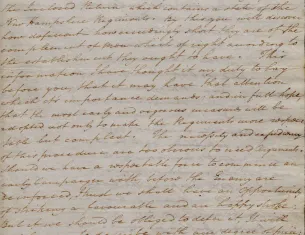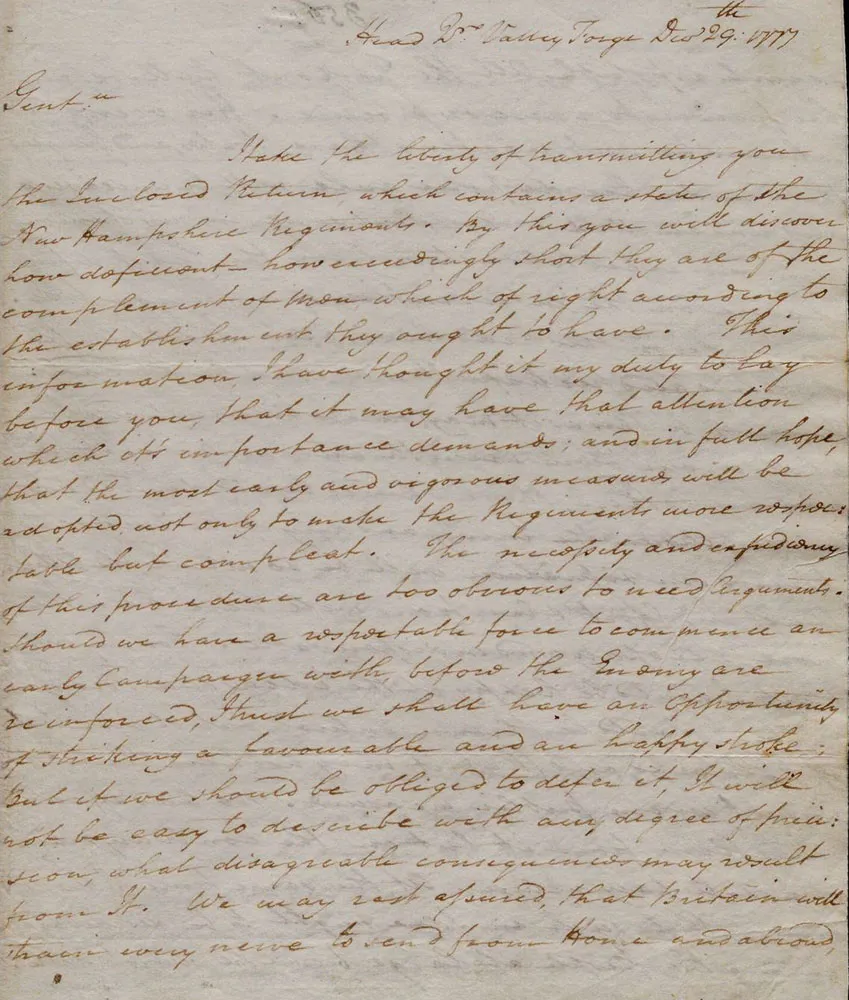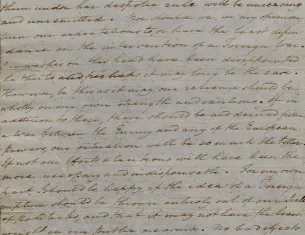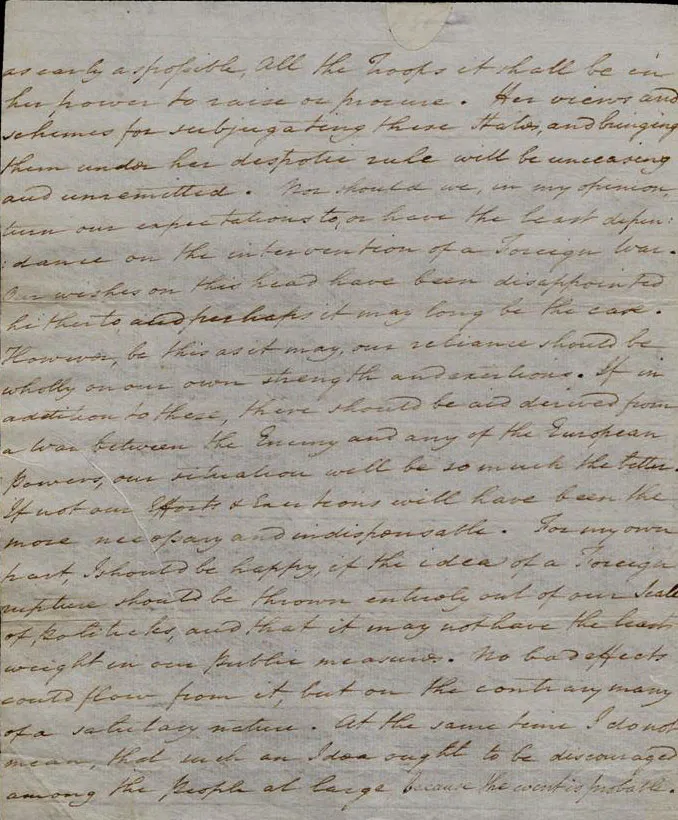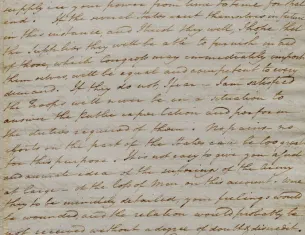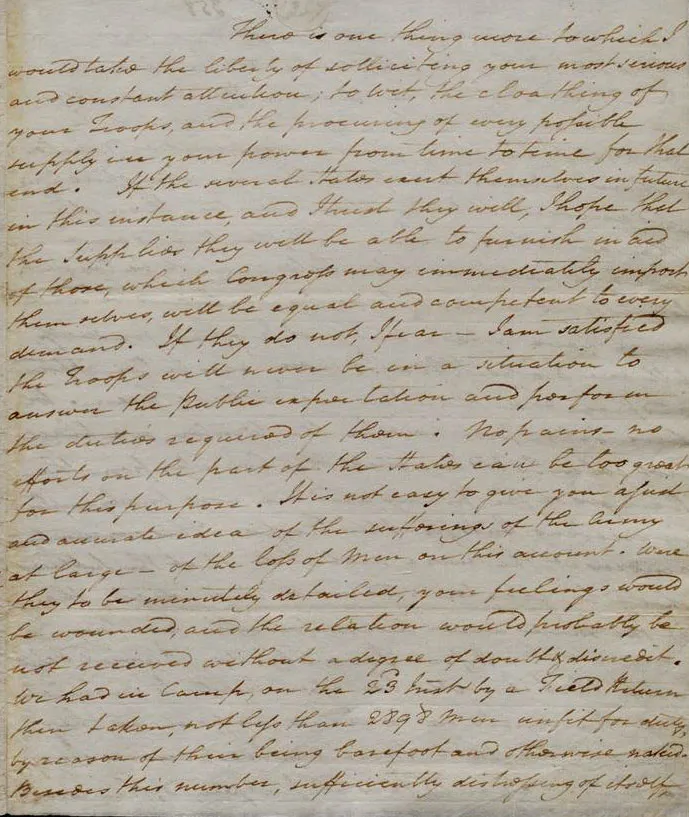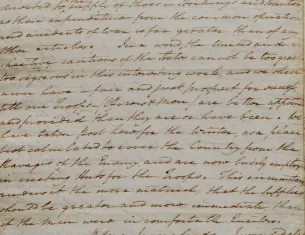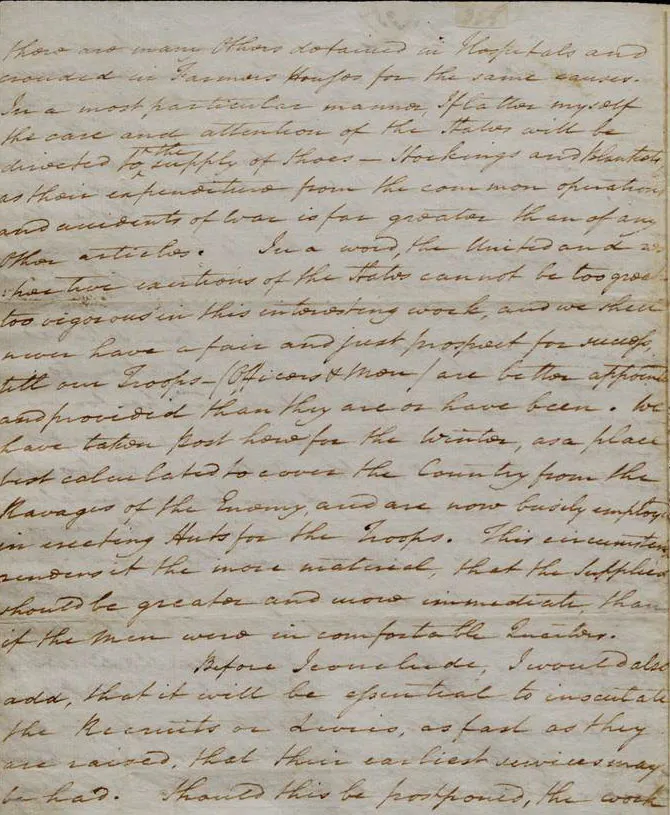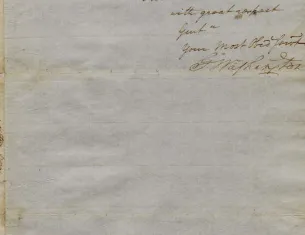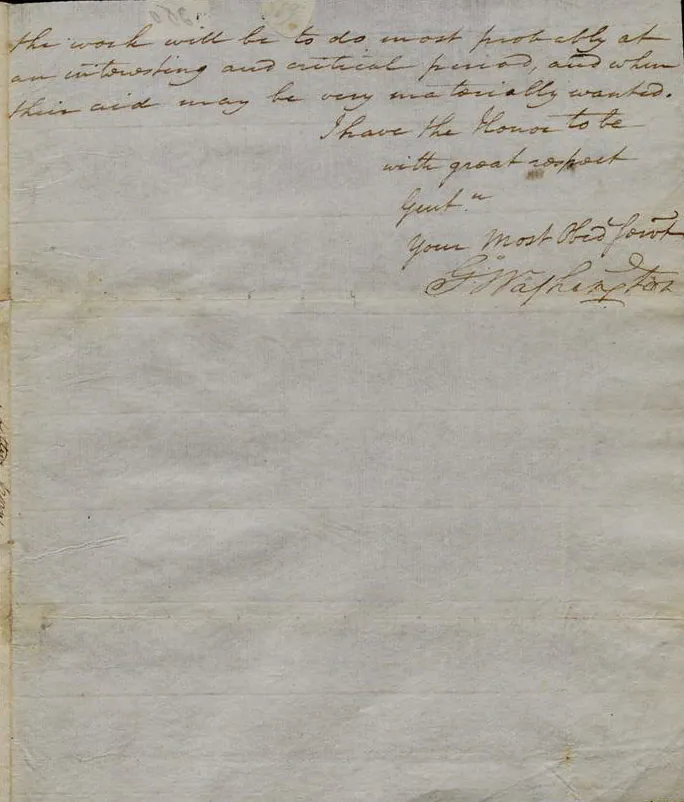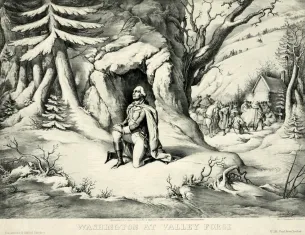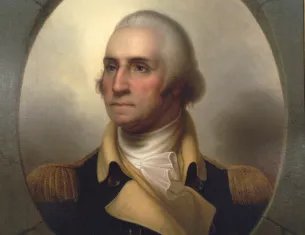George Washington Sends an Urgent Request for Supplies, 1777
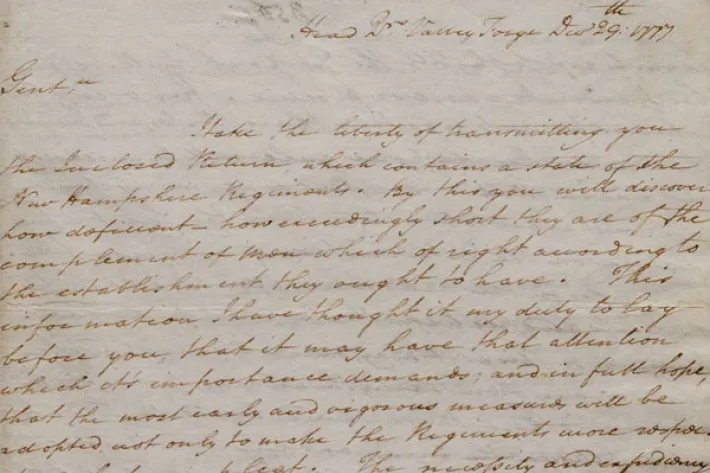
George Washington to the Convention of New Hampshire, December 29, 1777 (The Gilder Lehrman Institute of American History)
This circular letter, sent to all the states except Georgia, depicts Washington at his most impressive. In this version of the letter, which was sent to New Hampshire on December 29, 1777, Washington makes clear his urgency, gives a shocking but compassionate description of the plight of his troops, and issues his stern but considered warnings of the consequences of failure.
George Washington to the Convention of New Hampshire, December 29, 1777
Head Qrs: Valley Forge Dec 29th: 1777
Gentn:
I take the liberty of transmitting you the Inclosed Return which contains a state of the New Hampshire Regiments. By this you will discover how deficient – how exceedingly short they are of the complement of men which of right according to the establishment they ought to have. This information I have thought it my duty to lay before you, that it may have that attention which it’s importance demands; and in full hope, that the most early and vigorous measures will be adopted, not only to make the Regiments more respectable but compleat. The necessity and expediency of this procedure are too obvious to need Arguments. Should we have a respectable force to commence an early Campaign with, before the Enemy are reinforced, I trust we shall have an Opportunity of striking a favourable and an happy stroke; But if we should be obliged to defer it, It will not be easy to describe with any degree of precision, what disagreable consequences may result from It. We may rest assured, that Britain will strain every nerve to send from Home and abroad, as early as possible, All the Troops it shall be in her power to raise or procure. Her views and schemes for subjugating these States, and bringing them under her despotic rule will be unceasing and unremitted. Nor should we, in my opinion, turn our expectations to, or have the least dependance on the intervention of a Foreign War. Our wishes on this head have been disappointed hitherto, and perhaps it may long be the case. However, be this as it may, our reliance should be wholly on our own strength and exertions. If in addition to these, there should be aid derived from a War between the Enemy and any of the European Powers, our situation will be so much the better. If not our Efforts & Exertions will have been the more necessary and indispensable. For my own part, I should be happy, if the idea of a Foreign rupture should be thrown entirely out of our Scale of politicks, and that it may not have the least weight in our public measures. No bad effects could flow from it, but on the contrary many of a salutary nature. At the same time I do not mean, that such an Idea ought to be discouraged among the people at large, because the event is probable.
There is one thing more to which I would take the liberty of solliciting your most serious and constant attention; to wit, the cloathing of your Troops, and the procuring of every possible supply in your power from time to time for that end. If the several States exert themselves in future in this instance, and I trust they will, I hope that the Supplies they will be able to furnish in aid of those, which Congress may immediately import themselves, will be equal and competent to every demand. If they do not, I fear — I am satisfied the Troops will never be in a situation to answer the public expectation and perform the duties required of them. No pains — no efforts on the part of the States can be too great for this purpose. It is not easy to give you a just and accurate idea of the sufferings of the Army at large — of the loss of men on this account. Were they to be minutely detailed, your feelings would be wounded, and the relation would probably be not received without a degree of doubt & discredit. We had in Camp, on the 23rd Inst by a Field Return then taken, not less than 2898 men unfit for duty, by reason of their being barefoot and otherwise naked. Besides this number, sufficiently distressing of itself, there are many Others detained in Hospitals and crowded in Farmers Houses for the same causes. In a most particular manner, I flatter myself the care and attention of the States will be directed to the supply of Shoes — Stockings and Blankets, as their expenditure from the common operations and accidents of War is far greater than of any other articles. In a word, the United and respective exertions of the States cannot be too great, too vigorous in this interesting work, and we shall never have a fair and just prospect for success, till our Troops — (Officers & Men) are better appointed and provided than they are or have been. We have taken post here for the Winter, as a place best calculated to cover the Country from the Ravages of the Enemy, and are now busily employed in erecting Huts for the Troops. This circumstance renders it the more material, that the Supplies should be greater and more immediate than if the men were in comfortable Quarters.
Before I conclude, I would also add, that it will be essential to inoculate the Recruits or Levies, as fast as they are raised, that their earliest services may be had. Should this be postponed, the work will be to do most probably at an interesting and critical period, and when their aid may be very materially wanted.
I have the Honor to be
with great respect
Gentn.
Your most Obed Servt
Go: Washington
Source: George Washington to the Convention of New Hampshire, December 29, 1777, The Gilder Lehrman Institute of American History, GLC03706
George Washington to the Convention of New Hampshire, December 29, 1777
Head Qrs: Valley Forge Dec 29th: 1777
Gentn:
I take the liberty of transmitting you the Inclosed Return which contains a state of the New Hampshire Regiments. By this you will discover how deficient – how exceedingly short they are of the complement of men which of right according to the establishment they ought to have . . . and in full hope, that the most early and vigorous measures will be adopted, not only to make the Regiments more respectable but compleat . . . Should we have a respectable force to commence an early Campaign with, before the Enemy are reinforced, I trust we shall have an Opportunity of striking a favourable and an happy stroke; But if we should be obliged to defer it, It will not be easy to describe with any degree of precision, what disagreable consequences may result from It . . .
There is one thing more to which I would take the liberty of solliciting your most serious and constant attention; to wit, the cloathing of your Troops . . . It is not easy to give you a just and accurate idea of the sufferings of the Army at large — of the loss of men on this account. Were they to be minutely detailed, your feelings would be wounded, and the relation would probably be not received without a degree of doubt & discredit . . . Not less than 2898 men unfit for duty, by reason of their being barefoot and otherwise naked. Besides this number . . . there are many Others detained in Hospitals and crowded in Farmers Houses for the same causes . . . In a word, the United and respective exertions of the States cannot be too great . . . and we shall never have a fair and just prospect for success, till our Troops — (Officers & Men) are better appointed and provided than they are or have been. We have taken post here for the Winter, as a place best calculated to cover the Country from the Ravages of the Enemy, and are now busily employed in erecting Huts for the Troops . . .
Before I conclude, I would also add, that it will be essential to inoculate the Recruits or Levies, as fast as they are raised, that their earliest services may be had . . .
I have the Honor to be
with great respect
Gentn.
Your most Obed Servt
Go: Washington
Source: George Washington to the Convention of New Hampshire, December 29, 1777, The Gilder Lehrman Institute of American History, GLC03706
deficient – not having enough of something
exertions – physical or mental efforts
inoculate – to vaccinate against a disease (small pox)
Background
This circular letter, sent to all the states except Georgia, depicts Washington at his most impressive. In this version of the letter, which was sent to New Hampshire on December 29, 1777, Washington makes clear his urgency, gives a shocking but compassionate description of the plight of his troops, and issues his stern but considered warnings of the consequences of failure.
Transcript
George Washington to the Convention of New Hampshire, December 29, 1777
Head Qrs: Valley Forge Dec 29th: 1777
Gentn:
I take the liberty of transmitting you the Inclosed Return which contains a state of the New Hampshire Regiments. By this you will discover how deficient – how exceedingly short they are of the complement of men which of right according to the establishment they ought to have. This information I have thought it my duty to lay before you, that it may have that attention which it’s importance demands; and in full hope, that the most early and vigorous measures will be adopted, not only to make the Regiments more respectable but compleat. The necessity and expediency of this procedure are too obvious to need Arguments. Should we have a respectable force to commence an early Campaign with, before the Enemy are reinforced, I trust we shall have an Opportunity of striking a favourable and an happy stroke; But if we should be obliged to defer it, It will not be easy to describe with any degree of precision, what disagreable consequences may result from It. We may rest assured, that Britain will strain every nerve to send from Home and abroad, as early as possible, All the Troops it shall be in her power to raise or procure. Her views and schemes for subjugating these States, and bringing them under her despotic rule will be unceasing and unremitted. Nor should we, in my opinion, turn our expectations to, or have the least dependance on the intervention of a Foreign War. Our wishes on this head have been disappointed hitherto, and perhaps it may long be the case. However, be this as it may, our reliance should be wholly on our own strength and exertions. If in addition to these, there should be aid derived from a War between the Enemy and any of the European Powers, our situation will be so much the better. If not our Efforts & Exertions will have been the more necessary and indispensable. For my own part, I should be happy, if the idea of a Foreign rupture should be thrown entirely out of our Scale of politicks, and that it may not have the least weight in our public measures. No bad effects could flow from it, but on the contrary many of a salutary nature. At the same time I do not mean, that such an Idea ought to be discouraged among the people at large, because the event is probable.
There is one thing more to which I would take the liberty of solliciting your most serious and constant attention; to wit, the cloathing of your Troops, and the procuring of every possible supply in your power from time to time for that end. If the several States exert themselves in future in this instance, and I trust they will, I hope that the Supplies they will be able to furnish in aid of those, which Congress may immediately import themselves, will be equal and competent to every demand. If they do not, I fear — I am satisfied the Troops will never be in a situation to answer the public expectation and perform the duties required of them. No pains — no efforts on the part of the States can be too great for this purpose. It is not easy to give you a just and accurate idea of the sufferings of the Army at large — of the loss of men on this account. Were they to be minutely detailed, your feelings would be wounded, and the relation would probably be not received without a degree of doubt & discredit. We had in Camp, on the 23rd Inst by a Field Return then taken, not less than 2898 men unfit for duty, by reason of their being barefoot and otherwise naked. Besides this number, sufficiently distressing of itself, there are many Others detained in Hospitals and crowded in Farmers Houses for the same causes. In a most particular manner, I flatter myself the care and attention of the States will be directed to the supply of Shoes — Stockings and Blankets, as their expenditure from the common operations and accidents of War is far greater than of any other articles. In a word, the United and respective exertions of the States cannot be too great, too vigorous in this interesting work, and we shall never have a fair and just prospect for success, till our Troops — (Officers & Men) are better appointed and provided than they are or have been. We have taken post here for the Winter, as a place best calculated to cover the Country from the Ravages of the Enemy, and are now busily employed in erecting Huts for the Troops. This circumstance renders it the more material, that the Supplies should be greater and more immediate than if the men were in comfortable Quarters.
Before I conclude, I would also add, that it will be essential to inoculate the Recruits or Levies, as fast as they are raised, that their earliest services may be had. Should this be postponed, the work will be to do most probably at an interesting and critical period, and when their aid may be very materially wanted.
I have the Honor to be
with great respect
Gentn.
Your most Obed Servt
Go: Washington
Source: George Washington to the Convention of New Hampshire, December 29, 1777, The Gilder Lehrman Institute of American History, GLC03706
Excerpt
George Washington to the Convention of New Hampshire, December 29, 1777
Head Qrs: Valley Forge Dec 29th: 1777
Gentn:
I take the liberty of transmitting you the Inclosed Return which contains a state of the New Hampshire Regiments. By this you will discover how deficient – how exceedingly short they are of the complement of men which of right according to the establishment they ought to have . . . and in full hope, that the most early and vigorous measures will be adopted, not only to make the Regiments more respectable but compleat . . . Should we have a respectable force to commence an early Campaign with, before the Enemy are reinforced, I trust we shall have an Opportunity of striking a favourable and an happy stroke; But if we should be obliged to defer it, It will not be easy to describe with any degree of precision, what disagreable consequences may result from It . . .
There is one thing more to which I would take the liberty of solliciting your most serious and constant attention; to wit, the cloathing of your Troops . . . It is not easy to give you a just and accurate idea of the sufferings of the Army at large — of the loss of men on this account. Were they to be minutely detailed, your feelings would be wounded, and the relation would probably be not received without a degree of doubt & discredit . . . Not less than 2898 men unfit for duty, by reason of their being barefoot and otherwise naked. Besides this number . . . there are many Others detained in Hospitals and crowded in Farmers Houses for the same causes . . . In a word, the United and respective exertions of the States cannot be too great . . . and we shall never have a fair and just prospect for success, till our Troops — (Officers & Men) are better appointed and provided than they are or have been. We have taken post here for the Winter, as a place best calculated to cover the Country from the Ravages of the Enemy, and are now busily employed in erecting Huts for the Troops . . .
Before I conclude, I would also add, that it will be essential to inoculate the Recruits or Levies, as fast as they are raised, that their earliest services may be had . . .
I have the Honor to be
with great respect
Gentn.
Your most Obed Servt
Go: Washington
Source: George Washington to the Convention of New Hampshire, December 29, 1777, The Gilder Lehrman Institute of American History, GLC03706
deficient – not having enough of something
exertions – physical or mental efforts
inoculate – to vaccinate against a disease (small pox)
